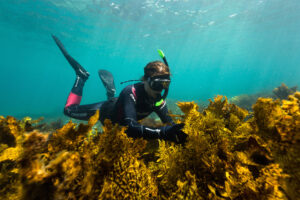On October 24th, WINGS WorldQuest will induct five new Fellows during our 2024 Women of Discovery Awards Gala in New York City. In a special Q&A series, we are sharing a little bit about each honoree. Prof Adriana Vergés is a marine ecologist whose research focuses on the ecology and conservation of coastal marine habitats. In particular, her team investigates the ecological impacts of climate change in our oceans and develops hands-on restoration solutions to protect and conserve marine ecosystems, including seagrass meadows, kelp forests and coral reefs.

WINGS: Tell us your story. How did you get involved in science and your field specifically?
PROF ADRIANA VERGÉS: I remember first learning that there was a degree called ‘Science of the Sea’ when I was 14 years old, and I was instantly attracted to it, because I have always found the sea such as a powerful, beautiful and mysterious realm. I loved the idea of spending more time in or on the ocean. I was also aware that we know very little about the sea and its creatures, and I was attracted to the idea of making discoveries to understand how this very different world functions. Everything in the ocean is extremely connected, and that means marine science is inherently a very holistic science – you can’t really understand ocean currents without understanding the atmosphere, you can’t understand ocean chemistry without also taking into account physical oceanography, and you can’t understand the biological components – the plants and animals and micro-organisms without understanding the physical aspects too. That holistic approach was also something that I found very attractive.
WINGS: What is something you would like people to understand about your work?
PROF ADRIANA VERGÉS: Kelp forests grow on one third of the world’s coastlines and over 750 million people live within 50 km of a kelp forest. And yet most people are completely unaware about the beauty and importance of these vital underwater ecosystems. This is a problem, as ~50% of the world’s kelp forests have become degraded or lost due to human activities. A general lack of awareness means there are no legal frameworks and very limited funding to protect them or restore them. I would love more people to understand how incredibly important kelp forests are, for biodiversity, for nutrient cycling, for carbon capture, for fishing but also for their spiritual and cultural value.
WINGS: What are the greatest barriers to more women working in science?
PROF ADRIANA VERGÉS: There are many ‘small’ mini-barriers, which add up. On the one hand there are the cultural and historical structures and ways of thinking that contribute to many small but powerful unconscious biases, which may lead to women considering themselves (in an unconscious way) as less capable/ less intelligent/ less good at science. For example, there may be an unconscious bias towards considering that boys and men are naturally better at some sciences like mathematics or physics, whereas girls and women may be naturally better at languages and writing. This may drive more girls and women towards the humanities, but also it may make girls and women that do go into science unconsciously expect themselves to be less good/ have lower expectations of themselves or think that they will have to work twice as hard.
There are also many structural barriers to women progressing their careers in science which are tightly linked with raising a family. The time when many university-educated women are ready to start a family (late 20s/ early 30s) is a crucially important time for career-development. It’s when big opportunities often start to emerge. Taking time out to have a baby can seriously jeopardise these opportunities, as it can make women slightly less competitive at crucial times compared to a male candidate who has not stopped, unless there is a deliberate structural mechanism to support women who interrupt their career and explicitly takes this into account. To make things worse, women who have interrupted their career to have a baby are often competing with men who not only have not stopped their careers, but may themselves be supported by a stay-at-home wife, who looks after all domestic matters. Even when women return to work, they very often carry a much heavier load in terms of domestic affairs. There is often an expectation that women will be the ones to manage the home, organise medical appointments, arrange babysitting arrangements etc. etc. which makes things hard and unequal when compared with a male who can spend more of their time working effectively.
I think some women are also put out by the perception of science as a highly competitive environment, where being a truly successful scientist is not compatible with also having a happy family life. Historically there used to be few role models showing women successfully thriving and enjoying both a rewarding science career AND raising a family happily.
Once women are working in science, there are also many conscious and unconscious biases that can lead to women to advance less within their fields. Women may speak less at meetings/ have lower opportunities to network/ go to conferences. Women may also be given less funding opportunities or promotions, and may be expected to do more of the ‘caring’ or organising roles within an organisation.
WINGS: What gets you up in the morning?
PROF ADRIANA VERGÉS: Being in nature, spending time with my family and friends, learning.
WINGS: What’s your next challenge?
PROF ADRIANA VERGÉS: Expanding the scale of our marine restoration efforts.
WINGS: Describe yourself in three words.
PROF ADRIANA VERGÉS: Passionate, Curious, Self-doubting